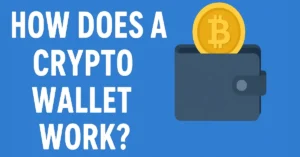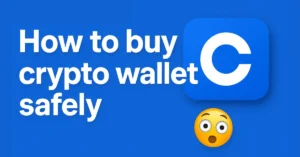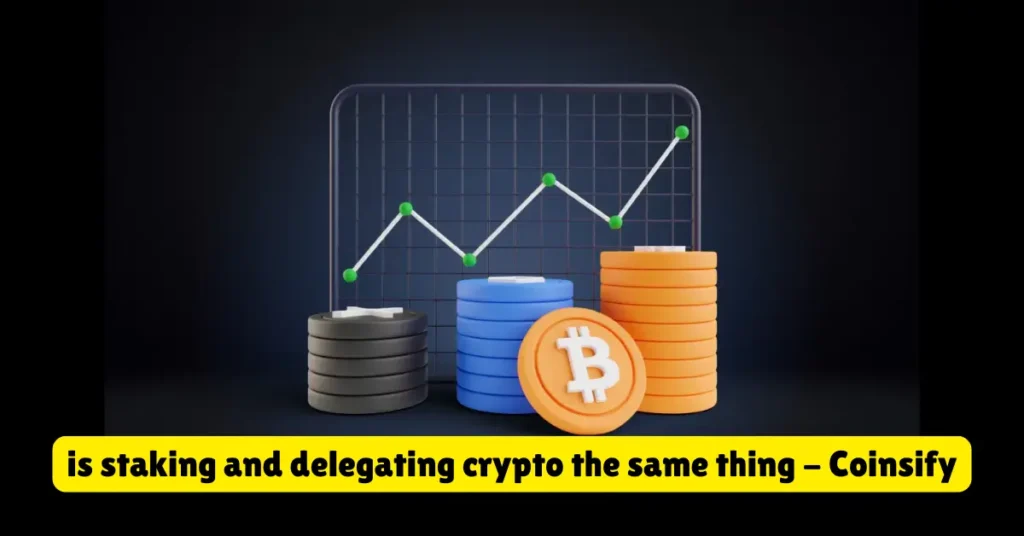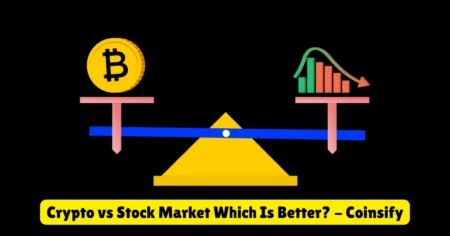is staking and delegating crypto the same thing
Introduction
In the ever-evolving world of cryptocurrency, more people are exploring ways to earn passive income without constantly buying and selling coins. One of the most popular methods for this is staking, which often comes up alongside a similar term—delegating. At first glance, they might seem like the same thing. After all, both involve locking up your crypto to earn rewards. But there’s a key difference in how they work and what role you play in the process.
This blog will break down the difference between staking and delegating, helping you understand which option fits your goals and technical comfort level. Whether you’re a beginner or someone looking to maximize rewards, knowing the difference can help you make smarter crypto decisions.
What is Delegating in Crypto?
Delegating in crypto is the process of assigning your coins to a validator or staking service so they can stake on your behalf. It’s a way to earn rewards from staking without needing to run your own node or have deep technical knowledge.
When you delegate your tokens, you’re not giving them away or transferring ownership. Your coins stay in your wallet, but they are linked to a validator who does the work of securing the network and validating transactions. In return, you receive a share of the staking rewards that the validator earns.
This method is commonly used in Proof-of-Stake (PoS) and Delegated Proof-of-Stake (DPoS) blockchains, such as Cosmos, Cardano, and Tezos. Delegating allows more users to participate in network security and earn passive income, even if they don’t have the resources or skills to operate a validator themselves.
For example: If you hold ATOM (the token for Cosmos), you can delegate it to a validator through your wallet interface. The validator stakes it on your behalf, and you receive regular rewards, typically minus a small commission fee.
In short, delegation is a low-risk, low-effort way to benefit from staking—perfect for beginners and passive investors.
Key Differences Between Staking and Delegating
While staking and delegating both involve earning rewards by locking your crypto, the way they work—and your level of involvement—are quite different. Here’s a breakdown of the main differences:
| Aspect | Staking (Direct) | Delegating |
| Who manages the node? | You manage and run your own validator node | A third-party validator runs the node for you |
| Technical skill needed | High – requires setup, maintenance, and uptime | Low – just a few clicks to delegate from your wallet |
| Risk level | Higher – poor node performance can lead to penalties | Lower – validator takes the operational risk |
| Control | Full control over the staking process and decisions | Limited control – depends on the validator’s performance |
| Reward potential | Higher (no commission taken) | Slightly lower (validator takes a small commission) |
| Token ownership | Remains with you | Remains with you |
| Setup effort | Complex and time-consuming | Easy and quick |
In summary:
- Staking is ideal for users who have the time, knowledge, and desire to actively manage their investment.
- Delegating is perfect for those who want to earn staking rewards with minimal effort and risk.
When Should You Stake vs. Delegate?
Choosing between staking and delegating depends on your technical knowledge, how much time you’re willing to invest, and your comfort with risk. Both options help you earn passive income, but they suit different types of users.
✅ Stake Directly If:
- You have technical skills and understand how to run a validator node.
- You’re comfortable with maintaining uptime and network performance.
- You want full control over your staking setup.
- You’re aiming for maximum rewards without paying validator commission fees.
- You’re staking a large amount and want long-term involvement in the network.
Example: Tech-savvy users running their own hardware or cloud servers on networks like Ethereum 2.0.
✅ Delegate If:
- You’re new to crypto or don’t have technical expertise.
- You prefer a hands-off, easy setup.
- You’re staking smaller amounts.
- You want to avoid the risk of penalties from validator downtime.
- You trust a reliable validator to manage the work.
Example: A casual investor using a wallet interface to delegate Tezos or Cardano to a validator with just a few clicks.
In short:
- Stake if you’re ready to take on more responsibility for higher rewards.
- Delegate if you prefer convenience, lower risk, and minimal setup.
Pros and Cons of Each Approach
Understanding the advantages and disadvantages of staking and delegating can help you choose the method that aligns best with your goals and technical comfort.
Staking (Direct)
Pros:
| Higher potential rewards (no validator commission) |
| Full control over the validator and staking process |
| Direct contribution to the network’s security and decentralization |
Cons:
| Requires technical knowledge and constant maintenance |
| Higher risk if the validator node fails or is penalized |
| Needs more time, effort, and resources to set up and manage |
Delegating
Pros:
| Easy to start, even for beginners |
| No need to manage hardware or software |
| Lower risk and responsibility—validator handles operations |
| Tokens remain in your wallet (you keep ownership) |
Cons:
| Slightly lower rewards due to validator commission |
| You rely on the validator’s performance and reputation |
| Less control over how staking is managed |
Common Misconceptions
Many people confuse staking and delegating or misunderstand how they work. Here are some common myths and the truth behind them:
“Staking and delegating are the same thing.”
Not quite. While both involve locking up tokens to earn rewards, staking usually refers to running a validator yourself, while delegating means assigning your tokens to someone else (a validator) to do the work for you.
“Delegating means giving away your crypto.”
False. When you delegate, your tokens never leave your wallet. You still own them and can undelegate or move them at any time, depending on the network’s rules.
“Staking is always better than delegating.”
Not necessarily. While staking can earn higher rewards, it comes with more technical work and risk. Delegating is simpler and safer for most users, especially beginners.
“If the validator misbehaves, I’ll lose all my tokens.”
Not completely true. Some networks may apply small penalties (called slashing) if the validator acts maliciously or goes offline, but you usually lose only a portion—not all—of your tokens. Choosing a trusted validator reduces this risk.
“I can’t delegate unless I have a large amount of crypto.”
Incorrect. Many blockchains allow delegation with small amounts of tokens, making it accessible to almost anyone with a supported wallet.
Frequently Asked Questions (FAQs)
Q1: Is staking and delegating the same thing?
A: No. Staking usually means running your own validator node, which requires technical skills. Delegating means you’re letting a trusted validator stake your tokens for you, while you still keep ownership and earn rewards.
Q2: Do I lose ownership of my coins when I delegate them?
A: Not at all. Your tokens stay in your wallet. You’re only allowing a validator to use them for staking. You can undelegate anytime (depending on the network rules).
Q3: Which is better—staking or delegating?
A: It depends. Staking gives you more control and higher rewards but requires technical knowledge. Delegating is easier and safer for most people, especially beginners.
Q4: Can I delegate small amounts of crypto?
A: Yes. Many blockchains allow delegation with small amounts, making it accessible even if you’re just getting started.
Q5: Is there any risk in delegating?
A: Delegating is generally low-risk, but if the validator you choose acts badly or goes offline, you might lose a small portion of your rewards. That’s why it’s important to choose a reliable validator.
Q6: How do I choose a good validator?
A: Look for validators with:
- A strong reputation
- High uptime
- Low commission fees
- A solid track record on the blockchain
You can usually see this information in your wallet or on the blockchain’s official explorer.
Q7: Can I stop delegating whenever I want?
A: Yes, but most blockchains have an “unbonding” period. This means it might take a few days before you can move or use your tokens after undelegating.
Q8: Do I pay any fees for delegating?
A: Validators usually take a small percentage of your rewards as a commission. This is how they earn for providing the service. The fee is usually transparent and reasonable.
Q9: Can I stake and delegate from my mobile wallet?
A: Yes. Many popular wallets (like Keplr, Trust Wallet, and Yoroi) support staking and delegation with simple mobile interfaces.
Q10: What happens to my rewards—are they automatic?
A: In most cases, rewards are added to your wallet regularly. Some networks let you automatically restake them, while others may require you to claim them manually.
Conclusion
Staking and delegating are both great ways to earn passive income from your crypto, but they work differently. If you’re tech-savvy and want full control, staking directly might be for you. If you prefer a simple, low-risk option, delegating is the better choice.
The key is to choose the method that fits your experience, comfort level, and goals. Either way, you’re helping secure the blockchain and growing your crypto at the same time.
Also read
- What is a Crypto Wallet and How Does It Work? – Coinsify
- 10 Crypto Terms Every Beginner Must Know – Coinsify
- What is Blockchain Technology – Complete Guide – Coinsify
- How to Buy Crypto Safely in 2025 – Complete Guide – Coinsify
- Bitcoin vs Ethereum: Key Differences Explained – Complete Guide
- Ultimate Blockchain Glossary: Learn Blockchain Terms Easily
- How to Buy Bitcoin Safely (Complete Beginner’s Guide)
- Top 10 Crypto Wallets for Beginners (2025 Edition)
- What is Cryptocurrency? A Beginner-Friendly Guide (2025)






